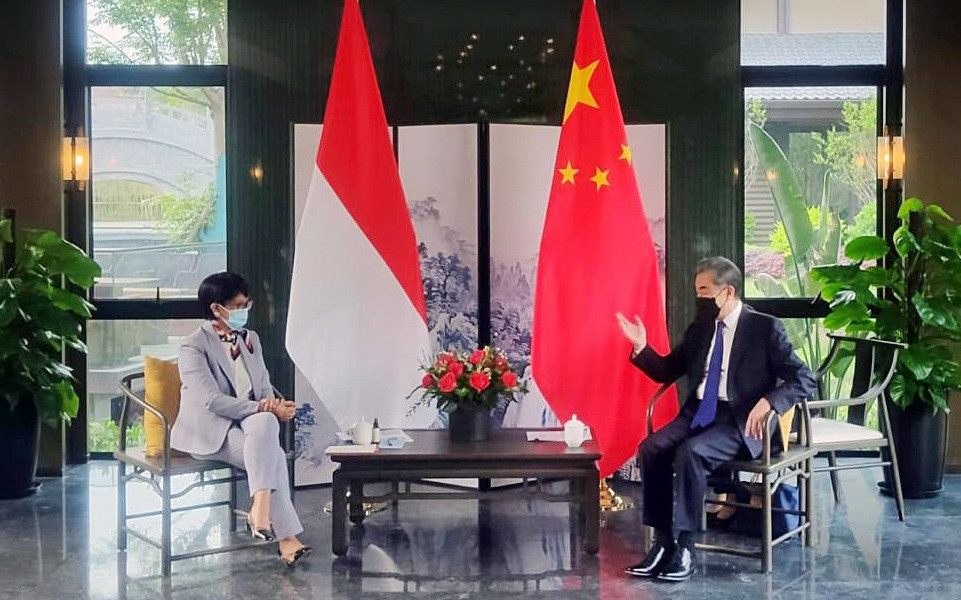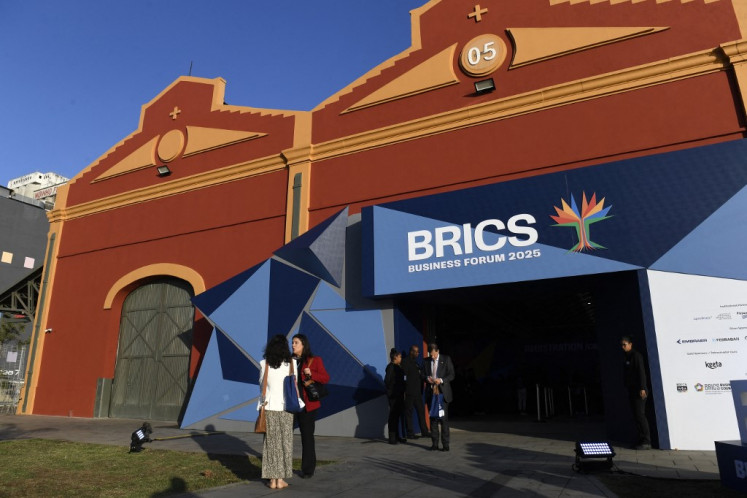Popular Reads
Top Results
Can't find what you're looking for?
View all search resultsPopular Reads
Top Results
Can't find what you're looking for?
View all search resultsRetno’s diplomatic journey to Tokyo and Fujian
In terms of geopolitical strategy, Japan will remain one of the most important economic partners for Indonesia and ASEAN. But it will soon be part of a nostalgic, unforgettable memory or romance as at present and in the near future, the region will be more dependent on China.
Change text size
Gift Premium Articles
to Anyone
A
young Japanese scholar expressed his curiosity about Foreign Minister Retno LP Marsudi’s intention to fly to Fujian in China to meet with her counterpart, Wang Yi, shortly after she and Defense Minister Prabowo Subianto held talks with Japanese Prime Minister Yoshihide Suga and Foreign Minister Toshimitsu Motegi in Tokyo last week.
Japan might feel irritated by the itinerary, but Indonesia could explain that the visit to Fujian “was planned as a return visit to Minister Wang Yi”.
In Fujian, Retno was accompanied by Trade Minister Muhammad Lutfi and State-Owned Enterprises (SOE) Minister Erick Tohir. Singapore’s Foreign Minister Vivian Balakrishnan, Malaysia’s Hishammuddin Hussein and Teodoro Locsin of the Philippines were also in Fujian last week for their own bilateral talks with Wang Yi.
“It’s an interesting move to watch because it suggests ASEAN’s strategic values amid constraints in China-United States, China-European Union relations,” said the fluent-Chinese speaking expert in his text message to me.
Japan is very active in boosting the role of the Quad’s — and informal group that includes the US, Japan, India and Australia — move to counter China. The group recently offered abundant supplies of COVID-19 vaccines, mostly produced in India, to the region. A few days ago, India revealed its plan to delay its exports due to a domestic hike in coronavirus cases.
Previously, two Japanese friends who have deep knowledge of Indonesia and China also shared with me their concern that Jakarta might prefer Beijing over Tokyo, despite Indonesia and Japan’s solid bilateral relations, especially in terms of the economy and investments. But at the same time, they admit that “we are also very dependent on our exports to China”.
From Fujian, the provincial origin of many Indonesian conglomerates, Retno obtained a crucial endorsement from China to hold a special summit on Myanmar, an assurance of the smooth flow of COVID-19 vaccines and new investment agreements; while in Tokyo, Indonesia ensured the transfer of technology in the production of security and fishery surveillance equipment, with China — in Japan’s mind — as the target.
As reported by China Daily, Wang Yi told his Indonesian guests of China’s support of a proposal to hold a special summit aimed at ending the chaos and bloodshed in Myanmar. On Friday, Retno confirmed China’s support of ASEAN’s efforts.
China has indicated a change in stance on Myanmar’s junta leader, Min Aung Hlaing, after the continuous brutal killings of demonstrators who protested the toppling of the democratically elected government of Aung San Suu Kyi. China is known to have good relations with Suu Kyi’s government.
In Fujian, Lutfi said China and Indonesia signed a letter of intent worth US$1.38 billion on Indonesia’s exports of swallows, fruits, wood products and furniture to China.
Meanwhile, Erick followed up on the consortium cooperation between the Indonesian Battery Company (IBC) and China’s Contemporary Amperex Technology Co. Ltd (CATL) to produce electric vehicle batteries. Erick hopes the cooperation will be worth around $5 billion when realized.
Retno and Prabowo paid a courtesy call to PM Suga last Tuesday after Retno held a bilateral meeting with her counterpart Motegi and Prabowo with his counterpart Nobuo Kishi as part of a two-plus-two ministers’ meeting. Prabowo and Kishi signed an agreement on the transfer of technology of Japanese-made defense equipment and know-how. Japan promised to hand over a fisheries surveillance vessel next year and another vessel is in the pipeline.
“To realize the vision of a free and open Indo-Pacific, I’d like to advance specific cooperation,” Suga told the Indonesian ministers at his office, suggesting that he wanted Jakarta to join the efforts to counter China.
Kyodo news agency quoted Kishi after meeting with Prabowo as saying that the two countries would urge China to refrain from trying to unilaterally change the status quo in the South China Sea and strongly oppose any action by China that could escalate tensions in regional waters. But Prabowo later clarified, emphasizing the use of “diplomacy and dialogue in resolving disputes between countries and upholding the rule of law in dealing with any disputes”.
In January last year, President Joko “Jokowi” Widodo received Motegi in Jakarta, just a few days after visiting Natuna, to show his determination to guard Indonesia’s territorial sovereignty in Natuna and its waters. Chinese coastguard and fishing vessels have often entered Indonesia’s exclusive economic zone near Natuna. At that time, Jokowi invited Japan to invest more in fisheries, energy and tourism in Natuna.
In terms of geopolitical strategy, Japan will remain one of the most important economic partners for Indonesia and ASEAN. But it will soon be part of a nostalgic, unforgettable memory or romance as at present and in the near future, the region will be more dependent on China.
Indonesia, however, should avoid repeating the “mistake” Japan made after the Asian financial crisis. Then-Japanese companies abandoned Indonesia and ASEAN and rushed to China. The firms put all their eggs in China’s basket. After all, Japan is still very powerful as the world’s third-largest economy, despite sluggish economic growth and an aging population.
The 10-member ASEAN can be torn between China and the US with its allies and strategic partners such as India, Australia and Japan, who want to impose Indo-Pacific cooperation according to their own vision. Indonesia and its ASEAN neighbors can benefit from the rivalry between the two giants, but by doing so, they may be playing with fire.
***
Senior editor at The Jakarta Post










